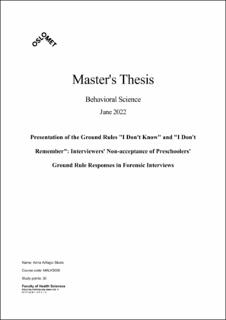| dc.description.abstract | Ground rules in facilitated forensic interviews are utilized to help preschoolers become more informative and less vulnerable to leading questions. Non-acceptance of their “I don’t know” and “I don’t remember” ground rule responses can lead to them providing information they previously indicated they did not know or remember. Earhart et al. (2014) conducted a field study regarding children`s “don’t know” responses, and two of the present studies hypotheses (hypotheses three and five) are based on their findings. These are: (3) presentation of ground rules “I don’t know” and “I don’t remember” does not increase probability for “I don’t know” and “I don’t remember” responses in children to substantial questions. (5) Followed by interviewers non-acceptance of “I don’t know” and “I don’t remember” responses, a significant proportion of children will provide information they earlier expressed they did not know or remember. The present study viewed “I don’t know” and “I don’t remember” as two separate responses due to their differences, while Earhart et al., (2014) did not. The purpose of this study, which was a quantitative analysis of transcribed interviews (field study), was to make a modified replication of Earhart et al. (2014) on interviews conducted in Norway with preschool children. The results revealed that preschoolers tended to answer follow-up questions even though they earlier expressed they did not know or remember the information requested. Interviewers non-acceptance of the GR responses, and the accuracy of children`s changed responses after non-acceptance, will be discussed. Directions for future research and the study`s limitations will be presented. Interviews with children is a field which originates from cognitive psychology. However, the topic of the thesis will also be accounted for and discussed from a behavioral analytic approach. | en_US |
